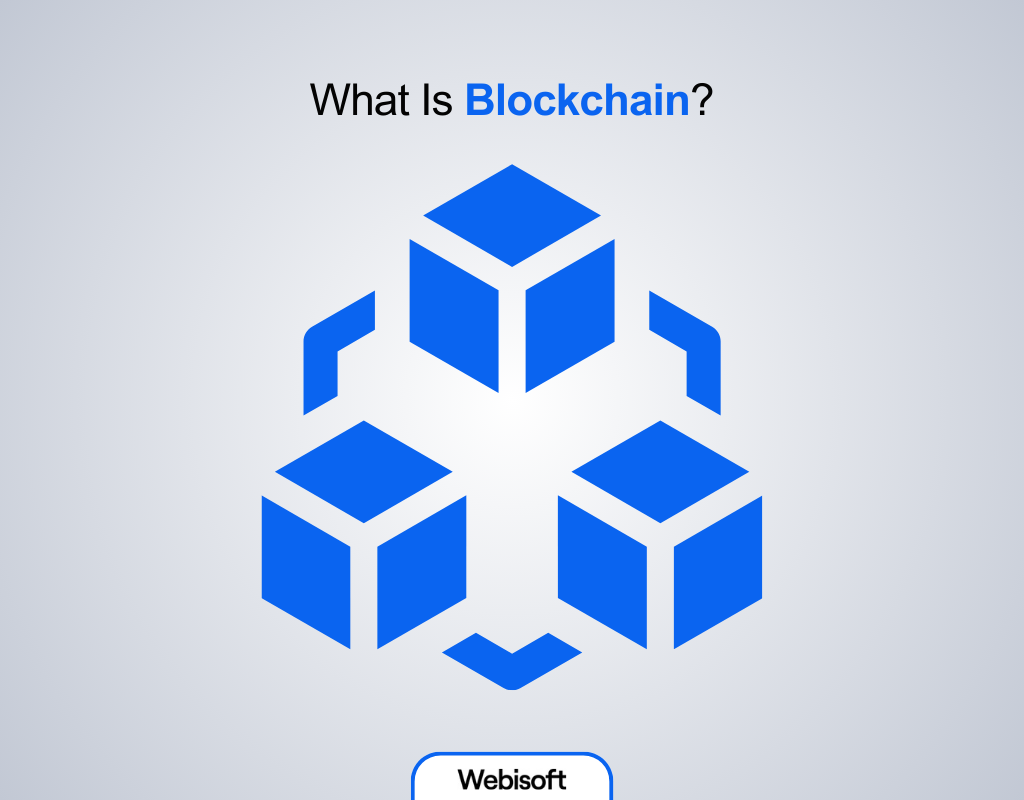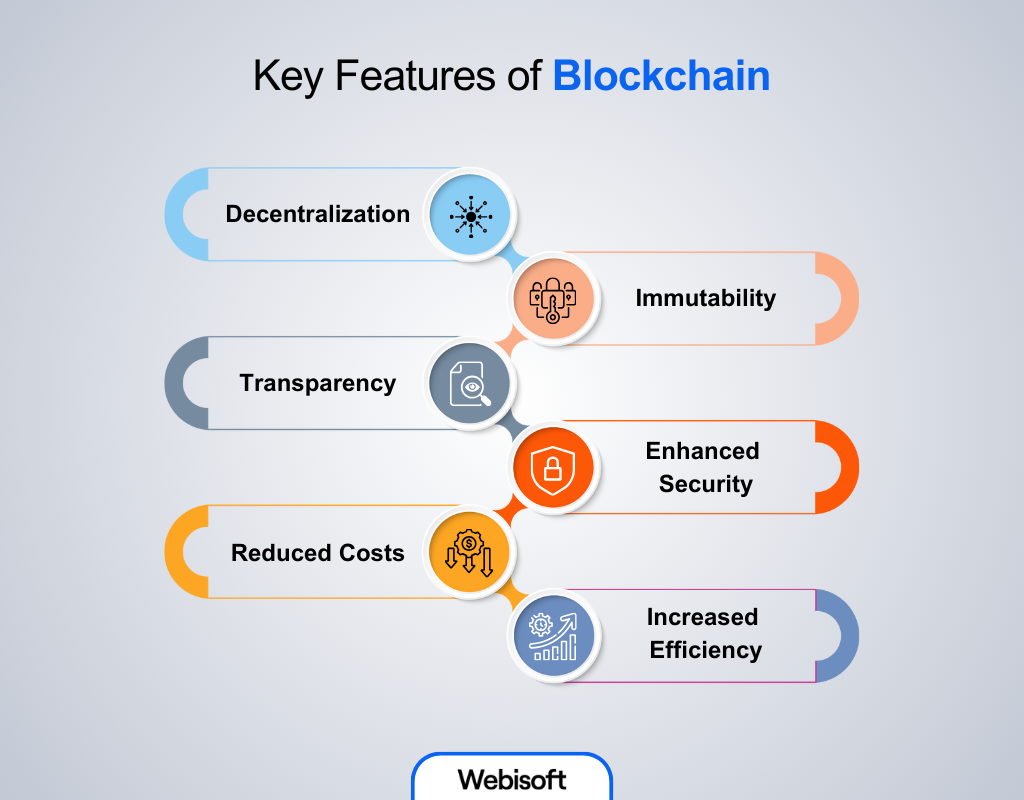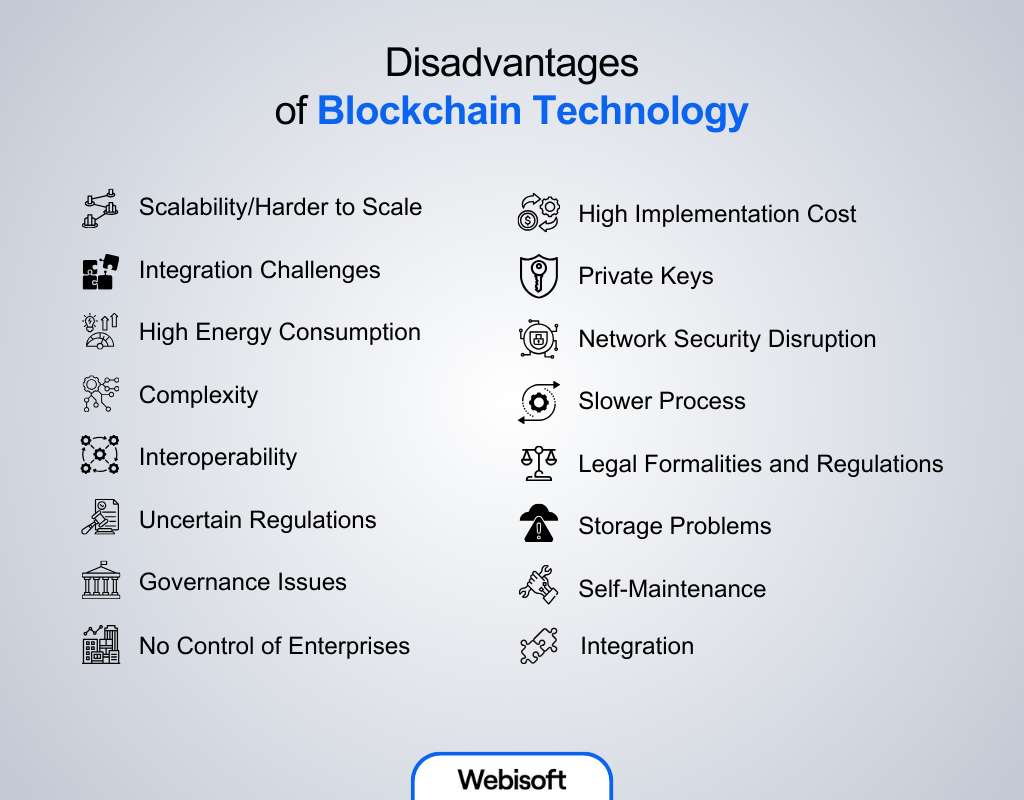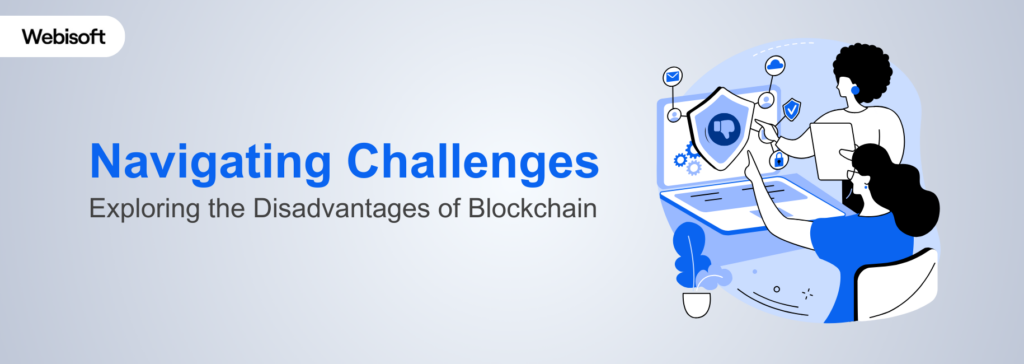Did you know that while blockchain technology is innovative, it has come with several challenges? Are you now curious to learn about the disadvantages of blockchain?
The disadvantages include high energy consumption, scalability issues, integration complexity, and more. Overcoming these drawbacks involves innovative solutions like energy-efficient consensus mechanisms, scalability enhancements, and seamless integration strategies.
Are you also facing challenges in adopting blockchain technology? Webisoft is here to explore these disadvantages of blockchain, ensuring a smooth transition to this advanced technology for your business.
Contents
- 1 What Is Blockchain?
- 2 Key Features of Blockchain
- 3 Disadvantages of Blockchain Technology
- 3.1 Scalability/Harder to Scale
- 3.2 Integration Challenges
- 3.3 High Energy Consumption
- 3.4 Complexity
- 3.5 Interoperability
- 3.6 Uncertain Regulations
- 3.7 Governance Issues
- 3.8 No Control of Enterprises
- 3.9 High Implementation Cost
- 3.10 Private Keys
- 3.11 Network Security Disruption
- 3.12 Slower Process
- 3.13 Legal Formalities and Regulations
- 3.14 Storage Problems
- 3.15 Self-Maintenance
- 3.16 Integration
- 4 Final Note
- 5 Frequently Asked Questions
What Is Blockchain?

Blockchain is a digital ledger technology. It is known for its role in powering cryptocurrencies like Bitcoin. Imagine a chain of blocks, each securely holding batches of transactions. Every block is linked to the one before, creating a chronological chain.
This technology is decentralized, meaning any single entity does not control it. Instead, it’s maintained by a network of computers. Its key features include immutability, transparency, and security.
Key Features of Blockchain

Blockchain technology is a groundbreaking innovation. In this exploration, we’ll uncover the key features of blockchain to give you a comprehensive understanding.
Decentralization
Blockchain’s one of the fundamental features is decentralization. Unlike traditional systems, blockchain distributes its data across a computer network. This decentralization raises security and reduces the risk of data manipulation or centralized failure. It empowers users by giving them control over their data.
Immutability
Another crucial aspect of blockchain is immutability. But how does this feature function?
Once data is recorded on a blockchain, altering or deleting it is nearly impossible. This feature ensures the integrity of your data. It provides a trustworthy platform for transactions and record-keeping.
However, this also means that any error in the data entry becomes permanent.
Transparency
Blockchain offers an unmatched level of transparency. However, blockchain’s every transaction is perfectly recorded on a public ledger, accessible to all participants. This transparency builds users’ trust and raises privacy concerns, as every transaction is visible to everyone on the network.
Enhanced Security
Blockchain’s security is bolstered by cryptographic algorithms, making it incredibly secure against hacks and frauds. However, while the blockchain is closed, the applications built on it, like cryptocurrency exchanges, may still be vulnerable to attacks.
Reduced Costs
By eliminating intermediaries, blockchain reduces transaction costs. This is particularly beneficial for businesses, as it cuts down on fees paid to third parties. Yet, the high initial investment in blockchain technology can offset the cost-saving aspect.
Increased Efficiency
Blockchain automates and expedites processes, leading to increased efficiency. This is vital in sectors like finance, where speedy transactions are crucial.
Disadvantages of Blockchain Technology

Blockchain technology is celebrated for its innovation, but it’s essential to understand the blockchain disadvantages. This section will guide you through the various disadvantages of blockchain, offering a balanced perspective on this transformative technology.
So, let’s check out the drawbacks of blockchain in detail:
| Challenge | Description |
| Scalability | Struggles with speed and efficiency as networks grow, especially in Bitcoin. |
| Integration Challenges | Overhauling existing systems for integration is costly and time-consuming. |
| High Energy Consumption | Notorious for energy-intensive Proof of Work (PoW), raising environmental concerns. |
| Complexity | Intricate nature is a barrier, requiring technical expertise for adoption. |
| Interoperability | Different blockchains struggle to communicate, limiting broader applications. |
| Uncertain Regulations | Evolving and uncertain regulations create challenges for businesses. |
| Governance Issues | Decentralization leads to governance challenges, potential forks, and lack of control. |
| High Implementation Cost | Costly setup, development, and skilled personnel contribute to high costs. |
| Private Keys | Managing private keys poses security risks, especially for non-tech-savvy users. |
| Network Security Disruption | 51% attacks compromise network integrity, especially in smaller blockchains. |
| Slower Process | Transaction processing is slower due to consensus mechanisms, challenging rapid environments. |
| Legal Formalities and Regulations | Evolving legal frameworks and compliance challenges affect implementation. |
| Storage Problems | Expanding networks lead to significant storage demands, impacting operational costs. |
| Self-Maintenance | Ongoing and resource-intensive maintenance tasks for network integrity. |
| Integration | Requires careful planning and expertise, addressing compatibility issues. |
Scalability/Harder to Scale
Scalability is a significant issue for blockchain technology. As blockchain networks grow with more users and transactions, they often need help to maintain speed and efficiency. This is a crucial issue for networks like Bitcoin.
Innovations like the Lightning Network or sharding are being explored to address this. However, scalability remains a fundamental challenge that needs stronger solutions.
Integration Challenges
Integrating blockchain into existing technological infrastructures poses its own set of challenges. To effectively implement blockchain, companies often need to overhaul their existing systems. It can be a daunting, expensive, and time-consuming task.
This complexity stems from blockchain’s unique data structure and operational mechanisms, significantly different from traditional databases.
Additionally, integrating blockchain requires a certain level of technical expertise. It may not be readily available in many organizations. As a result, developing more user-friendly blockchain integration tools and platforms is crucial for broader adoption.
High Energy Consumption
Blockchain networks, particularly those employing Proof of Work (PoW), are notorious for their high energy usage. This intense energy demand stems from the computational power required to validate transactions and maintain the network.
The environmental impact of such consumption is a growing concern. It positions blockchain as less eco-friendly when compared to other technologies. The sustainability of blockchain is under scrutiny, as the energy it consumes often comes from non-renewable sources.
This aspect challenges the notion of blockchain being a completely beneficial technology. It’s crucial to consider environmental costs when evaluating blockchain’s overall impact.
Complexity
Blockchain technology’s intricate nature can be challenging. For those not well-versed in tech, its complexity acts as a significant barrier. Understanding blockchain requires familiarity with distributed ledgers, encryption, and consensus algorithms.
This complexity isn’t just a problem for individual users. It also impacts businesses looking to adopt the technology. Simplifying its interface and making the technology more accessible is essential for broader adoption.
Otherwise, If blockchain stays too complicated, only a few people will use it. Making it easier to use without losing its security is important to help more people use blockchain.
Interoperability
Interoperability in the blockchain world refers to the ability of different blockchain networks to communicate and work together seamlessly. However, achieving this interoperability is challenging because each blockchain operates on its unique protocol and standards.
This limitation significantly impacts the technology’s potential for broader applications, such as in global trade or cross-platform collaborations. To realize the full potential of blockchain, developing standards and protocols that enable smooth interaction between different blockchains is essential.
Uncertain Regulations
The regulatory details for blockchain technology are still in flux, which presents a significant challenge. Governments and regulatory bodies worldwide are trying to understand and frame rules around this new technology. It leads to uncertainty and unpredictability in the regulatory environment.
This uncertainty can be a significant problem for businesses and investors, as they may need clarification on how future regulations will affect blockchain-based projects.
Without clear guidelines, companies might hesitate to invest heavily in blockchain initiatives. They fear regulatory changes that could impact the feasibility or legality of their projects.
Therefore, clear, consistent, and supportive regulations are crucial for nurturing an environment. In this environment, blockchain technology can thrive and be safely integrated into various industries.
Governance Issues
Blockchain governance involves the rules and decision-making processes that guide the network’s operation. However, these governance structures often face challenges. Since blockchains are decentralized, there’s no single authority to make decisions.
When participants disagree on upgrades or changes, it can lead to forks – splits in the blockchain. Forks create separate paths with different rules, which can confuse users and disrupt the network’s uniformity.
Imagine two groups can’t agree on a change, leading to two blockchains. This division can weaken the integrity and trust in the system. For blockchain to remain stable and consistent, effective governance models that prevent or manage forks are essential.
No Control of Enterprises
Enterprises face a significant limitation in a decentralized blockchain environment: lack of control. They cannot govern the network as they might with traditional systems. This aspect can be unsettling for businesses that have complete authority over their data and operations.
In a decentralized blockchain development, data is distributed across the network, and no single entity can alter it unilaterally. This situation can pose a challenge for enterprises needing to comply with regulations or wanting to keep certain information confidential.
For instance, a company cannot easily modify or delete data from the blockchain if required for legal reasons. This lack of control requires businesses to rethink their data management and security approach in a blockchain context.
High Implementation Cost
Implementing blockchain technology often comes with a hefty price tag. This is not just about the initial setup but also encompasses various aspects like developing the necessary infrastructure and continuous maintenance.
For instance, a company looking to adopt blockchain must invest in robust hardware and software, hire skilled blockchain developers, and possibly train existing staff. Additionally, finding the right expertise can be costly since blockchain is a relatively new technology.
This high implementation cost can be a problem, especially for small businesses with limited budgets. It makes them think twice before adopting this technology.
Private Keys
Private keys are crucial in securing access to blockchain assets in the blockchain world. These keys are like complex digital passwords to access and transact with your blockchain assets.
However, managing these private keys can be daunting, especially given the security risks involved. This permanence of loss adds a layer of risk for users, especially those not tech-savvy or familiar with secure digital asset management.
Network Security Disruption
Blockchain’s reputation for security is well-earned, yet it’s not entirely invulnerable. A significant threat to blockchain networks is the possibility of a 51% attack. This occurs when a single group or entity gains enough control of the network’s mining power.
With such control, they can manipulate the network to their advantage, potentially reversing transactions or double-spending. This kind of attack primarily threatens smaller, less-established blockchains, where accumulating a majority of mining power is more feasible.
While larger networks like Bitcoin are less susceptible due to their size, the risk cannot be completely disregarded. The limitations of blockchain is a reminder that the decentralized nature of blockchain energy requires vigilant security measures. And it needs constant monitoring to prevent such disruptions.
Slower Process
While secure and transparent, blockchain technology often faces criticism for its slower processing speed compared to traditional databases.
This is largely due to its consensus mechanisms, like Proof of Work or Proof of Stake. These are essential for maintaining the network’s integrity and trustworthiness.
Each transaction must be validated and added to the blockchain, which ensures security but also takes time. This delay is a significant drawback in scenarios where rapid transaction processing is essential, such as high-frequency trading or real-time data analysis.
The challenge lies in enhancing blockchain’s speed without compromising its security and decentralization. It is a crucial area of focus for developers aiming to broaden blockchain’s applicability in fast-paced environments.
Legal Formalities and Regulations
Dealing with legal formalities and regulations in the blockchain space can be a complex and daunting task. As blockchain technology is relatively new, many legal frameworks and regulatory standards are still evolving to accommodate it.
This uncertainty can create limitations for businesses and developers looking to implement blockchain-based solutions. They must explore areas where rules vary significantly between jurisdictions, and compliance is critical.
This legal and regulatory complexity not only adds to the workload but also poses risks of non-compliance, potentially resulting in legal repercussions.
It can also slow down the pace of innovation, as developers and companies may need to constantly adapt to changing legal requirements. Moreover, it affects the overall development and implementation timeline of blockchain projects.
Storage Problems
As blockchain networks expand and accumulate more transactions, their storage needs also grow exponentially. Each node in the network must store the blockchain’s complete copy. It leads to significant data requirements.
This storage demand can be a substantial challenge, especially for larger blockchains with extensive transaction histories. It can increase operational costs for maintaining these networks, as more storage capacity and more robust infrastructure are needed.
The storage requirements might also be prohibitive for individual users or smaller organizations wishing to participate in the blockchain network. This challenge can limit the number of full nodes in the network.
Moreover, it potentially impacts the decentralization and security that are fundamental to blockchain’s appeal. Therefore, finding efficient data storage solutions is crucial for the scalability and practicality of blockchain systems.
Self-Maintenance
Maintaining a blockchain network is an ongoing and often resource-intensive task. Unlike traditional systems, blockchains are decentralized. This means they rely on a network of participants, rather than a single entity, to manage and maintain their operation.
Regular updates and checks are crucial to safeguard the network’s integrity and performance. These tasks include verifying transactions, adding new blocks, and ensuring the entire system’s security. This maintenance requires significant computational power and energy for those participating in the network, especially miners in Proof of Work (PoW) systems.
The process is crucial for the smooth running of the network and ensures the trust and reliability that blockchain platforms promise.
Integration
Businesses should understand what is a company intranet, as it can serve as a secure infrastructure for integrating blockchain, helping to manage internal communications and data more efficiently.
This integration requires careful planning and a deep understanding of both blockchain and the systems it will interface with. This can mean substantial investment in technical expertise and development time for businesses.
Compatibility issues may arise, as blockchain’s decentralized nature and data structure may not seamlessly align with more centralized, traditional systems. Successfully integrating blockchain can lead to increased efficiency and security.
Did you know having a certain level of technical expertise you can integrate blockchain into your business and overcome most of the disadvantages? Well, Webisoft is one such company to help you here.
Final Note
In summary, as we explore the blockchain world, it’s essential to acknowledge the disadvantages of blockchain as well. Despite its revolutionary impact, blockchain faces issues such as significant energy demands, scalability challenges, and complex integration with existing systems.
Adopting more energy-efficient blockchain models, enhancing scalability, and simplifying integration processes are key to overcoming these disadvantages.
However, are you considering blockchain but concerned about these drawbacks? Let Webisoft provide the expertise and solutions needed to effectively implement blockchain in your business.
Frequently Asked Questions
How does blockchain technology affect energy consumption?
Some blockchain implementations, especially those using Proof of Work, require significant energy, impacting environmental sustainability.
Is scalability a concern in blockchain technology?
Yes, scalability can be a significant drawback, as some blockchains struggle to efficiently handle large volumes of transactions.
Are there any privacy concerns with blockchain technology?
Despite its security, the transparent nature of blockchain can sometimes pose privacy challenges, especially in public ledgers.
Can the immutability of blockchain be a disadvantage?
Yes, the immutable nature of blockchain means once data is recorded, it cannot be altered, which can be problematic in certain situations.
